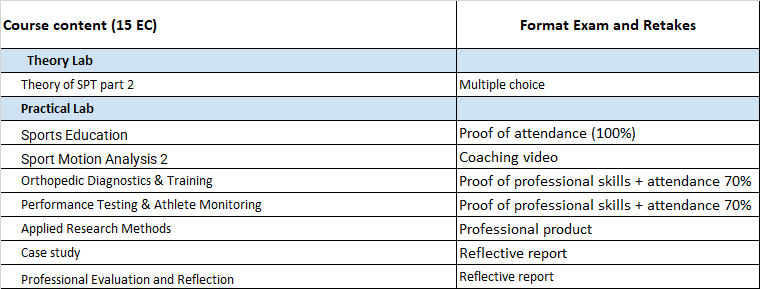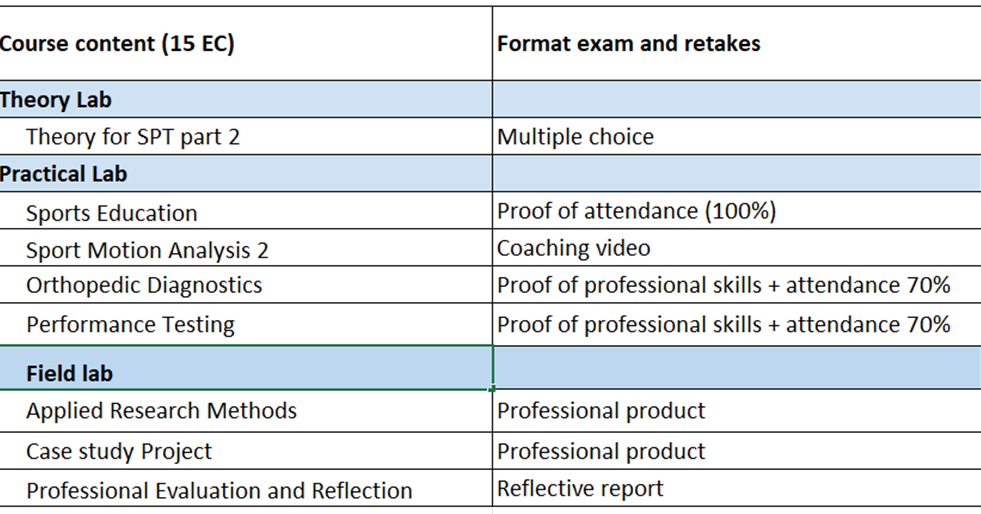Sports Physiotherapy
Dear students,
Before you proceed, please note the following:
-
If you want to take the entire minor (Foundations 15 EC & Applications 15 EC), you should enroll in this module "Sports Physiotherapy (30 EC)" only. First you take Foundations (block 1 of semester 1 (English spoken) or block 3 of semester 2 (Dutch spoken), then the applications (block 2 of semester 1 (English spoken) and block 4 of semester 2 - Dutch spoken). Note: you always take both blocks within the same semester!
-
If you want to do 15 EC only, then the only options you have is to register for the module Sports Physiotherapy - Foundations (15 EC). This module is taught in block 1 of semester 1 (English spoken) and block 3 of semester 2 (Dutch spoken).
This is done because you cannot follow the second part (applications) without having followed the first part, which lays the foundation for the second part. In the second part, we apply knowledge from the first part in practical situations. Please note we focus on the individual athlete and use a more qualitative case-based approach, you will learn to apply sports (injury) diagnostics from the first module to rehabilitation goals and trajectories, both on a physical and psychological level. Just like the first part, in the second part practical classes are also supported by a wide range of theory lessons such as Advanced Exercise Physiology, Sport & Performance Psychology and the role of Sport Nutrition for performance and recovery. You also learn to "zoom out" from individual level to what you can do for a sports club by collecting and analyzing performance data at the group level. Field assignments will support your development as a critical and more scholarly professional (e.g. the practitioner-scientist).
The first part covers the following topics, among others:
-
Sports clinics
-
Orthopedic diagnostics for sports injuries
-
Sports Motion Analysis
-
Performance testing of athletes
-
Exercise physiology & training
-
Sport & Performance Psychology (e.g., personality, motivation, confidence, mental health)
-
Injury prevention project
The second part covers the following topics, among others:
-
Sports clinics
-
Orthopedic diagnostics & case-based training for sports injuries
-
Sports Motion Analysis (Correcting and coaching of a sports motion error)
-
Performance testing and monitoring of athletes
-
Advanced Exercise Physiology (e.g., interpretation of cardio-pulmonary exercise tests, overtraining syndrome, recovery and cardio-respiratory health in endurance sports)
-
Sport & Performance Psychology (e.g., coping with injuries, mental health in (elite) athletes and a number of commonly used psychological skills trainings)
-
Applied research management
-
Case study
Leerdoelen
The main learning objectives of the first part "Foundations" are:
-
describe and explain some common fundamentals of sport biomechanics, exercise physiology, and sport & performance psychology';
-
perform sports related orthopedic diagnostics tests skilled and routinely;
-
perform selected sports performance tests accurately, safely and validly;
-
analyze performance demands and athletic requirements for a sport;
-
perform (yourself) and analyze some selected strength and conditioning exercises from a bio-mechanical perspective (applied level, not scientific).
-
carry out an injury prevention project at a sports club.
The main learning objectives of the second part "Applications" are:
-
Learn to assess and monitor both athletes' physical and mental performance and recovery:
-
able to take performance test in a case based or embedded sports science situation;
-
able to analyze cardiopulmonary exercise tests or lactate tests and prescribe endurance training guidelines for an individual athlete;
-
able to recognize mental health and recovery related issues in elite athletes.
-
-
Learn to create physical and mental training plans for rehabilitation of common sports injuries and sport performance:
-
able to apply selected case based physical training strategies (clinical vignettes);
-
ably to apply selected sport & performance psychological skills.
-
-
Learn to analyze collected data from group-level physical and mental performance tests from an embedded scientific point of view.
Ingangseisen
-
Student must have a background in Physiotherapy or Exercise therapy.
-
Students must have followed module 1 Foundations for Sport Physiotherapy.
-
Students must meet the minimum requirement for study points and have received permission from their own school to attend the minor.
-
Final check and approval by the coordinator is mandatory for registration.
Literatuur
Books:
-
Clinical Sports Medicine 5th Edition (Peter Bruckner, Ben Clarsen, Ann Cools, Kay Crossley, Mark Hutchinson, Paul Mc Crory Roald Bahr and Karim Khan) This book is available digitally through our library.
Other books will be announced at the start of the module.
Rooster
-
Classes are from Monday to Friday.
-
The timetable per week can differ.
-
Field assignments are part of this module, which may involve going to a client/ sport association outside working hours (Mon-Fri).
Contact time:
-
Roughly 10-15 hours a week
Mandatory activities: Sports clinics are mandatory. There are approximately 8 sports clinics * that can last from 1 to 2 hours. For practical classes, 70% attendance is mandatory. Data gathering days for performance testing and applied research methods are mandatory, these days can be organized on weekdays or in the weekend and times can vary from early in the morning, mid-day to the end of the day. Also locations can vary. Per week, on average this will be 6-8 hours. * Definitive number will be communicated at the start of the minor.
Toetsing
First part "Foundations"

Second part "Applications"

Resits:
Each exam can be taken twice during the semester this module runs. This means means you have one take and one retake within the semester. If you fail a retake, you can take that exam again next school year.
Please note:
-
You only have to retake the exam you failed (so you don't have to redo the entire minor)
-
You can retake the exams, assignments or portfolio proof only under the same conditions in the following year after you followed the minor. After one year, this right expires and you will have to do your retakes under the then current conditions.
If a minor is no longer offered or in case the minor is rewritten, the degree programme will offer students a further two opportunities to finalize this minor in the following year.
Aanvullende informatie
Costs: There are no additional costs for this module.
Please note:
Semester 1 the official language is English
Semester 2 the official language is Dutch, however all materials, the knowledge exams etcetera are in English.
Questions about the minor?
Contact Ferdinand de Haan f.h.de.haan@hva.nl or Ted Ronteltap t.ronteltap@hva.nl
Questions about the Kies op Maat procedure?
Contact Niermela Chote-sobha, n.chote-sobha@hva.nl